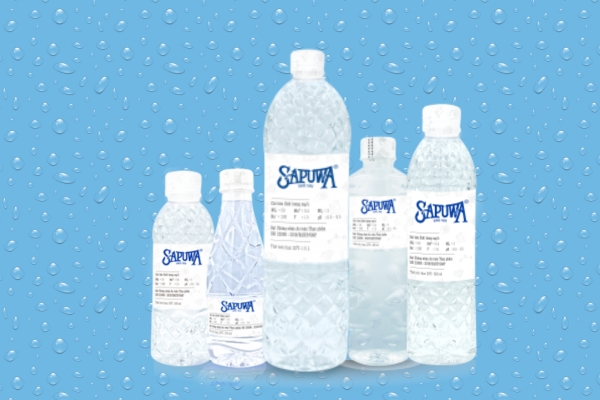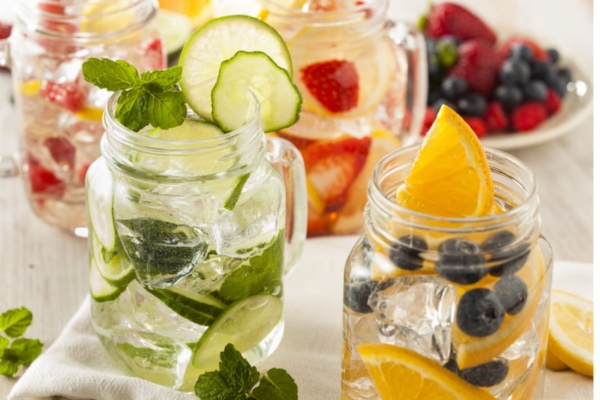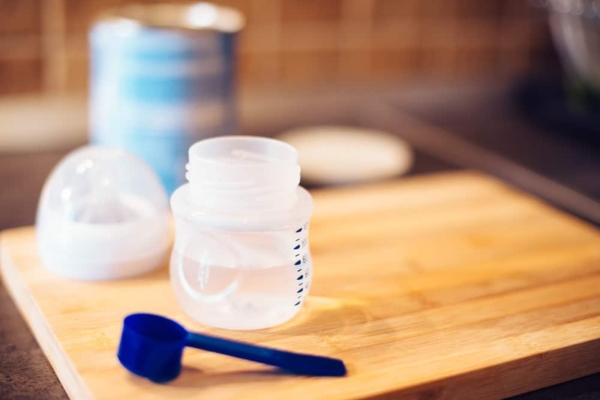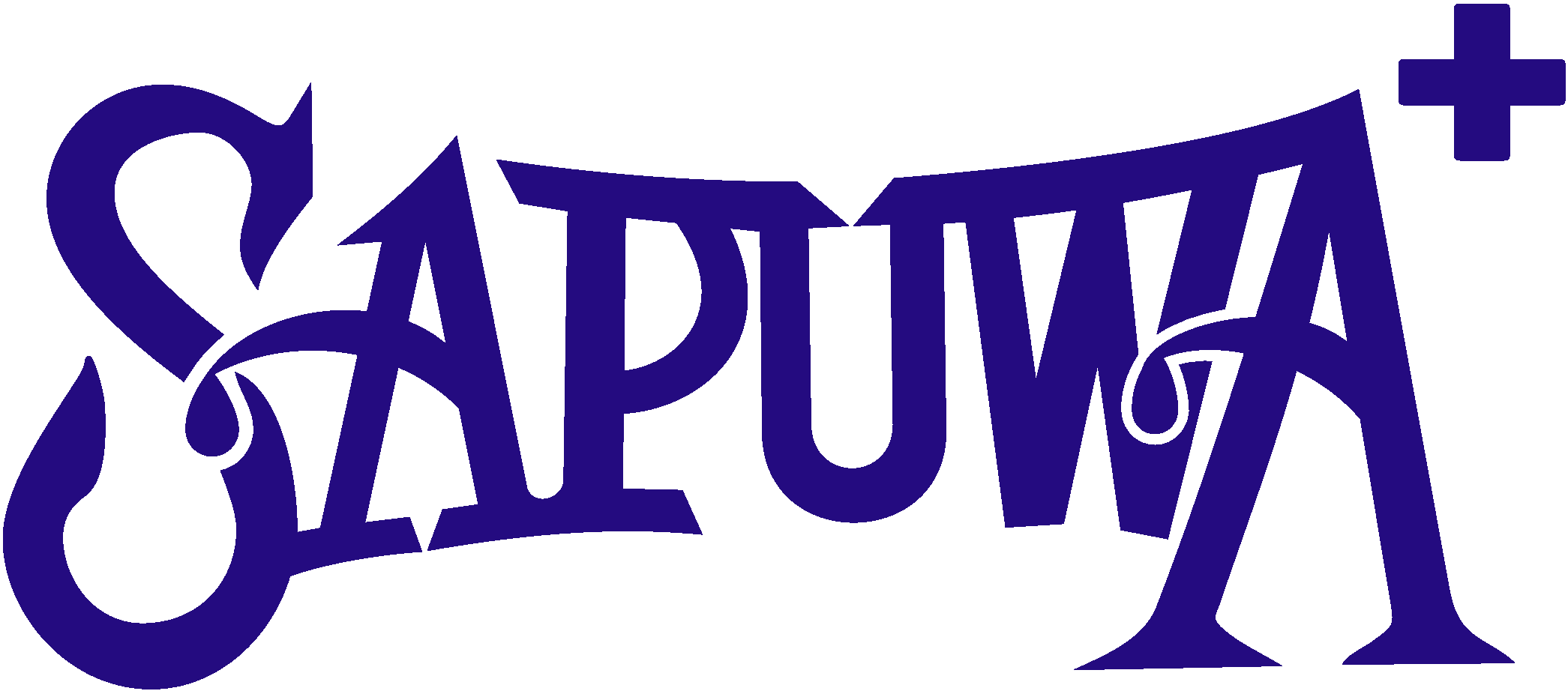Can SAPUWA pure water be used to mix milk and what should you pay attention to?
As parents, everyone wants to give their children the best, including choosing appropriate nutrition sources. Powdered milk plays an important role in the development of infants and young children. However, mixing milk properly, especially choosing the right type of water, is an issue that worries many parents. This article will answer in detail the question "Can SAPUWA pure water be mixed with milk?" along with important notes when preparing milk for your baby.
1. Can SAPUWA purified water be mixed with milk?

SAPUWA pure water can be used to make baby milk. SAPUWA water is produced according to modern processes, ensuring high quality standards and achieving safety certification from the Ministry of Health of Vietnam. Water is filtered through many layers of advanced filter membranes, completely removing impurities, microorganisms and heavy metals, providing pure water, safe for your baby's health.
However, it should be noted that not all pure water is suitable for mixing milk. Some types of purified water may contain high levels of minerals, affecting your baby's ability to absorb nutrients. Therefore, it is best to choose pure water produced specifically for children, such as SAPUWA water.
2. Types of water that should not be used to mix milk

Below are some types of water that should not be used to prepare baby milk:
2.1. Boiled vegetable broth
Vegetable broth seems safe, but it has potential health risks, especially for children. The reason is because:
High nitrate content: Boiling water of some vegetables such as beets, carrots, mustard greens, cabbage, sugar beets,... contains a lot of nitrate. When entering the body, nitrate will be converted into methemoglobin, causing red blood cells to lose the ability to transport oxygen. If not treated promptly, this condition can lead to death.
Plant drugs in vegetables: Vegetables are often fertilized with plant drugs. When cooking, these chemicals can dissolve into the boiling water. Children using vegetable broth mixed with milk may be poisoned by the amount of this chemical.
Therefore, it is recommended not to give children vegetable broth, especially infants and children under 6 months old. Instead, provide your child with enough filtered water or milk as recommended by your doctor.
2.2. Pressed fruit juice
Fruits, especially citrus fruits, provide many essential vitamins and minerals for the body, including vitamin C.
Vitamin C helps the body effectively absorb iron from milk and food, supporting the body's metabolism. hematopoiesis, especially important for young children. However, fruit juice is completely unsuitable for mixing milk for children because:
- Vitamin C and organic acids in fruit juice: These substances will cause clumping of casein - the main protein in milk, causing indigestion and bloating in children.
- Vitamins are destroyed by temperature: When mixing milk with warm water, the vitamins in the juice will evaporate and lose their effectiveness.
- Therefore, use filtered water to prepare baby formula according to the manufacturer's instructions. Filtered water is safe and does not affect the nutrients in milk.
2.3. Mineral water
Many parents mistakenly believe that using mineral water to mix baby milk will help supplement minerals for the baby. However, this concept is completely wrong and poses many potential risks to children's health.
Reasons why you should not mix baby milk with mineral water:
- Creates dangerous intermediates: Mineral water contains many minerals, but when combined with ingredients in milk, it can create some intermediates that are harmful to children's health.
- Causes nutritional imbalance: Children's nutritional needs are very diverse, including many different vitamins and minerals. Mineral water only provides certain types of minerals. If used for a long time, children may be deficient in other essential nutrients, affecting overall development.
- Causes digestive disorders: Mineral water can contain high sodium content, which is not suitable for children's sensitive digestive systems, leading to bloating, indigestion, and diarrhea.
3. Some notes when mixing milk with pure water

To ensure the safety and health of your baby when mixing milk with pure water, parents need to note the following:
Prepare the appropriate mixing tools and milk type
- Prepare bottles, nipples and milk mixing equipment.
- Choose the type of milk appropriate to your baby's age and needs.
- Consult your doctor or nutritionist for specific advice on the type of milk suitable for your baby.
Sterilize tools before and after preparing milk
- Wash bottles, teats and milk mixing equipment with hot water and soap.
- You can use a sterilizer with boiling water for 5-10 minutes to sterilize milk mixing equipment. You should sterilize milk mixing utensils before each use because if you miss just one minute, bacteria in the milk mixing utensils can cause your baby to have diarrhea.
Prepare boiled water to make milk
- Boil water for at least 1 minute to kill bacteria. Then, let the water cool to the appropriate temperature (about 40°C) before mixing the milk.
- Do not use cold water or water that is too hot to mix milk.
Clean your hands when mixing
Wash your hands with soap before mixing milk to avoid bacteria from entering the milk and dry your hands thoroughly. The milk spoon may get wet while your hands are still wet and when you put the spoon back in the box, the milk will be lumpy or moldy, affecting the quality of the milk and its health. Strong baby's.
Nails should be cut short and kept clean.
Check the dosage
When preparing milk for your baby, it is extremely important to follow the instructions for use on the product packaging. However, parents also need to pay attention to adjusting the amount of milk to suit each baby's needs.
Instructions for mixing milk on the packaging are for reference only. The manufacturer clearly states the amount of water and milk powder corresponding to each child's age. However, mixing milk that is too diluted or too thick will negatively affect your baby's health.
Check the milk mixing temperature
To make sure the milk is not too hot and burns your baby, you need to check the temperature of the milk before feeding your baby. The simplest way is to put a few drops of milk on your wrist. If you feel warm but not hot, your baby can nurse right away. If the milk is too hot, wait a little longer for it to cool down.
Absolutely do not test the temperature of the milk by holding the pacifier and sucking it. This can cause the baby to transmit many harmful bacteria from the tester's oral cavity. Instead, use a specialized thermometer to accurately measure milk temperature. The appropriate temperature for breastfeeding is about 37°C, equivalent to the baby's body temperature.
Can SAPUWA purified water be mixed with milk? Choosing the right water source to prepare baby's milk is one of the top concerns. SAPUWA purified water is a safe and good choice for your baby's health. However, parents need to pay attention to choosing the right pure water and follow the principles of mixing milk properly to ensure their baby's health.
Hopefully this article has provided you with useful information about using SAPUWA pure water to prepare milk for babies. If you have any questions, consult your doctor or nutritionist for specific advice.
Marketing SAPUWA
Relative post
- The secret to staying hydrated when traveling for a complete trip
- What should women over 30 drink to have beautiful skin and a youthful figure?
- Where should you go on September 2 in Ho Chi Minh City - Top 10 extremely hot places today
- September 2nd, where should we travel to heal our souls?
- Explain what electrolyte disorders are and effective ways to prevent them
- Alkaline ionized cooking water does not reveal surprising benefits
- Electrolyzed water to treat atopic dermatitis takes advantage of natural power
- Ways to alkalize the body protect health and prevent disease
- 5 signs of excess acid in the body and effective ways to balance it
- The secret to drinking water properly after eating to protect your health
- Types of water you should and shouldn't drink at night for a good night's sleep
- The secret to making tea with alkaline ionized water is especially delicious








 0
0


